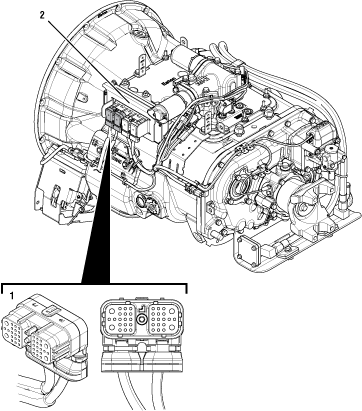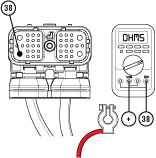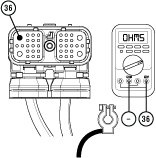Fault Code 37: Power Connect
J1587: MID 130 SID 251 FMI 5
J1939: SA 3 SPN 627 FMI 5
Overview
The UltraShift PLUS transmission is equipped with electronic components that require a high current. It is critical that the OEM power supply be able to deliver the proper voltage and current in these high-load situations for smooth and efficient shifting. Additional resistance introduced into the system can cause the supplied voltage to drop low enough to cause performance issues. Fault Code 37 indicates an excessive resistance between the power supply source (battery or starter) and the Transmission Electronic Control Unit (TECU).
Detection
The TECU monitors the OEM power supply circuit for excessive resistance by measuring the voltage drop during high current demands, such as a shift request, and calculates a resistance value based on those demands. Fault Code 37 sets Active when the calculated resistance during high-load conditions exceeds 0.4 ohms and the TECU has not detected any low or weak battery system faults.
Conditions to Set Fault Code Active
FMI 5 – Current Below Normal or Open Circuit: TECU calculates a resistance value based on high current demands and sets the fault code Active when that resistance exceeds 0.4 ohms.
Fallback
No fallback mode is associated with this fault; however, transmission performance issues may be presented.
Conditions to Set Fault Code Inactive
TECU calculates a resistance value below 0.4 ohms.
Possible Causes
FMI 5
- Vehicle Power Supply
- In-line fuse corrosion or loose connection
- Wiring shorted to ground, shorted to power or open
- Bent, spread, corroded or loose terminals
- Vehicle Batteries
- Internal failure or high resistance
Component Identification
 |
1. 38-Way Vehicle Harness Connector 2. Transmission Electronic Control Unit (TECU) |
Fault Code 37 Troubleshooting
Set vehicle parking brake and chock wheels.
Record the transmission fault codes, FMIs, occurrences, and timestamps from the Service Activity Report created during the Diagnostic Procedure.
Notice
If Fault Code 37 is Inactive and there are Active vehicle faults, refer to OEM for additional diagnostic instructions.
If Fault Code 37 is Inactive and there are Active transmission faults, troubleshoot all Active fault codes per Fault Code Isolation Procedure Index.
If Fault Code 37 is Active or Inactive, and there are no Active vehicle or transmission faults, Go to Step B
Key off.
Measure voltage across all batteries. Record reading(s) in table.
Inspect starter, battery terminals and transmission 30-amp in-line fuse holder connections for damage and bent, spread, corroded or loose terminals.
Visually inspect Vehicle Harness between the power supply and the TECU for signs of rubbing or chafing to the wiring.
Note: Some chassis use a power and ground distribution block separate from the battery or may route power and ground to the starter. Be sure to clean and inspect connections at this location and at the battery.
If damage is found, refer to OEM guidelines for repair or replacement of the vehicle power supply to the TECU. Go to Step V
If no damage is found, Go to Step C
| Battery Voltage |
|---|
Key off.
NoticeLoad Test each vehicle battery per OEM specifications. Record reading(s) in table.
If all batteries pass the Load Test, Go to Step D
If any battery does not pass the Load Test, refer to OEM guidelines for repair or replacement of batteries. Go to Step V
| Battery | Voltage Drop | Load Test Status (Pass/Fail) |
|---|---|---|
| 1 | ||
| 2 | ||
| 3 | ||
| 4 | ||
| 5 |
Key off.
Disconnect 38-Way Vehicle Harness Connector from TECU.
Inspect connector body for damage, and bent, spread, corroded or loose terminals.
Disconnect Battery Positive (+) and Battery Negative (-) connections.
Measure resistance between 38-Way Connector Pin 38 and Battery Positive (+) connection. Record reading(s) in table.

Measure resistance between 38-Way Connector Pin 36 and Battery Negative (-) connection. Record reading(s) in table.

Compare reading(s) in table.
If readings are in range, an intermittent issue exists with the vehicle power supply. Refer to OEM guidelines for repair or replacement of the vehicle power supply to the TECU. Go to Step V
If readings are out of range, refer to OEM guidelines for repair or replacement of the vehicle power supply to the TECU. Go to Step V
| Pins | Range | Reading(s) |
|---|---|---|
| 38 to Battery Positive (+) | 0.0–0.3 ohms | |
| 36 to Battery Negative (-) | 0.0–0.3 ohms |
Key off.
Reconnect all connectors and verify that all components are properly installed.
Key on with engine off.
Clear fault codes using ServiceRanger.
Drive vehicle and attempt to reset the code or duplicate the previous complaint.
Check for fault codes using ServiceRanger.
If no fault codes set Active and vehicle operates properly, test complete.
If Fault Code 37 sets Active during the test drive, Go to Step A
If a fault code other than 37 sets, troubleshoot per Fault Code Isolation Procedure Index.